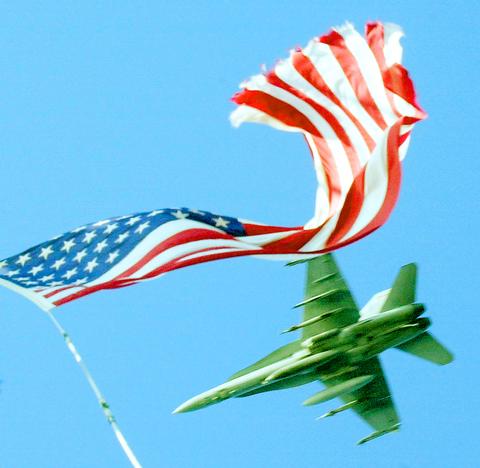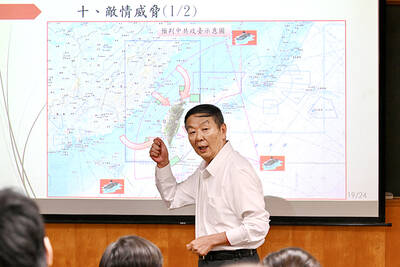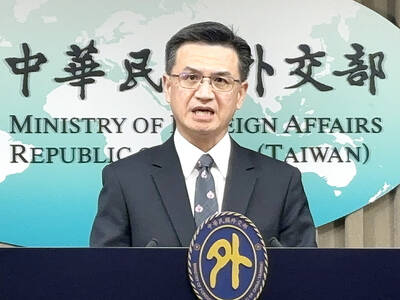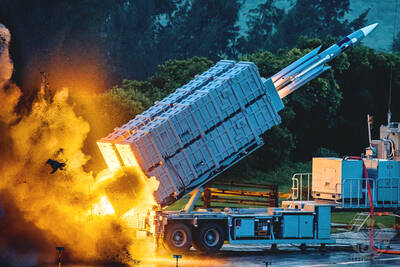US Vice President Dick Cheney said on Friday that after the Afghanistan campaign was over, America could use military action in a second wave of attacks directed against states which harbor terrorists.
Cheney said up to 50 states could be targeted for a range of action, from financial and diplomatic to military, on the grounds that they had al-Qaeda networks operating there.

PHOTO: AP
Somalia, the east African country which is a haven for al-Qaeda supporters, would be high on any US list of targets, alongside Iraq.
Planners in Washington and London are considering the next steps. The ease with which Kabul has fallen has encouraged hawks within the US administration who are keen to extend military action, particularly against Iraq.
A British Foreign Office source said: "Thinking is going on about a second phase but no decision has been taken yet and we would never speculate on it."
The British view is that direct military action against another state is unlikely and that action is more likely to be in partnership with other states against internal enemies.
Cheney, in a rare public foray, said in an interview for the BBC's Pashtu service yesterday morning: "There are a great many places round the world where there are cells of the al-Qaeda organization. Maybe as many as 40 or 50.
"We're working with the services of other countries and other governments to try to wrap those organizations up."
This threat of military action serves a useful purpose for Washington, making governments more amenable to action against terrorism, either inside or outside their own boundaries.
US Defense Secretary Donald Rumsfeld asked the Pentagon to come up with post-Afghanistan options in which they were to think the unthinkable. The resulting general command papers were reported to have been dismissed by Rumsfeld for not being radical enough.
As yet, no specific military target outside Afghanistan has been agreed. That would change overnight if Osama bin Laden were to turn up in a country with close ties to his al-Qaeda, such as Somalia.
Somalia
Somalia would be an easy target as it is a "failed" state even more run-down than Afghanistan.
Dominic Simpson, an analyst with the Kroll Middle East Monitor, said he thought the next phase of the military campaign might involve Somalia.
"The sense of violation would be less than if the US was moving against a government that was functioning," he said. "It could be the next base for bin Laden if he is not caught in the meantime."
Neighboring African countries claim al-Qaeda has been active in Somalia since 1993. They say it was the base for bombings of US embassies in Kenya and Tanzania five years later and still has camps there.
If bin Laden was to escape from Afghanistan, Somalia is one of the few countries left that might provide him succor, though it is a harder place to hide in.
The main Somali group identified by Washington as close to al-Qaeda is al-Itihaad al-Islamiya (Islamic Unity), which is trying to take over a northeastern region.
Yemen
Yemen is home to several militant groups linked to al-Qaeda. The remit of the government does not extend into tribal areas where such groups have their camps.
The danger was reinforced last year when al-Qaeda operatives successfully launched an attack on the USS Cole from a dinghy.
The Yemeni president, Ali Abdullah Saleh, has been invited to the White House this month, suggesting the US wants to work in conjunction with the existing government.
Iraq
Rumsfeld has described as significant meetings in Prague between Mohammed Atta, a suspected leader of the Sept. 11 hijackers, and an Iraqi intelligence official. However, a firm connection between al-Qaeda and Iraq has proved elusive. Indeed, bin Laden's people have fewer footholds in Iraq than they do in Britain.
However, Saddam Hussein is regarded by Washington as one of the most dangerous leaders in the world, with potential access to weapons of mass destruction, and that is increasingly being regarded as sufficient justification for war.
Britain, though cooperating with the US in bombing Iraq in southern and northern no-fly zones in the past decade, is opposed to extending the war to Iraq because of the lack of a firm link.
The test of US intentions could come next month when the UN security council discusses sanctions against Iraq. Saddam's refusal to allow in UN weapons inspectors could turn out to be a casus belli.
Asia
Indonesia, the Philippines and Malaysia, which all have problems with al-Qaeda groups within their borders and with Muslim militants in general, have agreed to combined operations.
The US, which has a good relationship with these countries, yesterday expressed a desire to participate in any such operations.
It is especially close to the Philippines, and has offered it a generous military package.

RETHINK? The defense ministry and Navy Command Headquarters could take over the indigenous submarine project and change its production timeline, a source said Admiral Huang Shu-kuang’s (黃曙光) resignation as head of the Indigenous Submarine Program and as a member of the National Security Council could affect the production of submarines, a source said yesterday. Huang in a statement last night said he had decided to resign due to national security concerns while expressing the hope that it would put a stop to political wrangling that only undermines the advancement of the nation’s defense capabilities. Taiwan People’s Party Legislator Vivian Huang (黃珊珊) yesterday said that the admiral, her older brother, felt it was time for him to step down and that he had completed what he

Taiwan has experienced its most significant improvement in the QS World University Rankings by Subject, data provided on Sunday by international higher education analyst Quacquarelli Symonds (QS) showed. Compared with last year’s edition of the rankings, which measure academic excellence and influence, Taiwanese universities made great improvements in the H Index metric, which evaluates research productivity and its impact, with a notable 30 percent increase overall, QS said. Taiwanese universities also made notable progress in the Citations per Paper metric, which measures the impact of research, achieving a 13 percent increase. Taiwanese universities gained 10 percent in Academic Reputation, but declined 18 percent

BULLY TACTICS: Beijing has continued its incursions into Taiwan’s airspace even as Xi Jinping talked about Taiwan being part of the Chinese family and nation China should stop its coercion of Taiwan and respect mainstream public opinion in Taiwan about sovereignty if its expression of goodwill is genuine, the Ministry of Foreign Affairs (MOFA) said yesterday. Ministry spokesman Jeff Liu (劉永健) made the comment in response to media queries about a meeting between former president Ma Ying-jeou (馬英九) and Chinese President Xi Jinping (習近平) the previous day. Ma voiced support for the so-called “1992 consensus,” while Xi said that although the two sides of the Taiwan Strait have “different systems,” this does not change the fact that they are “part of the same country,” and that “external

UNDER DISCUSSION: The combatant command would integrate fast attack boat and anti-ship missile groups to defend waters closest to the coastline, a source said The military could establish a new combatant command as early as 2026, which would be tasked with defending Taiwan’s territorial waters 24 nautical miles (44.4km) from the nation’s coastline, a source familiar with the matter said yesterday. The new command, which would fall under the Naval Command Headquarters, would be led by a vice admiral and integrate existing fast attack boat and anti-ship missile groups, along with the Naval Maritime Surveillance and Reconnaissance Command, said the source, who asked to remain anonymous. It could be launched by 2026, but details are being discussed and no final timetable has been announced, the source